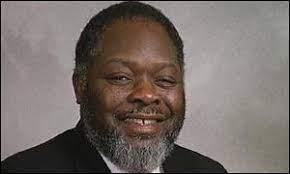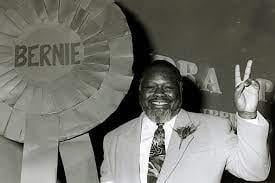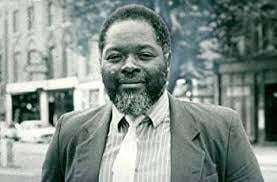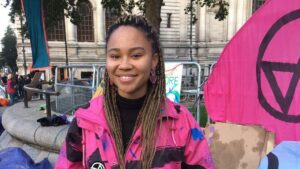Bernard Alexander Montgomery Grant
Bernie Grant was one of the first Black MPs in Britain. He joined the Tottenham Labour Party in 1973, was elected a Councillor in 1978, and then Leader of Haringey Council in1985, the first Black person to hold such a position. Elected as MP for Tottenham in1987, he was outspoken about inner city deprivation, institutionalised racism, and the legacy of colonialism.
1944
2000
Georgetown Guyana
Guyana descent
1969- Left Heriot-Watt University in protest over discrimination against Black students
1969-78 – Was an International Telephonist and became a leading activist in the Union of Post Office Workers
1970- One of the organisers of Post Office strikes
1978 – Became a full time Area Officer for National Union of Public Employees, NUPE (now UNISON).
1981-84 – Founded the Black Trades Unionists Solidarity Movement, and worked for it full time.
1973- Joined the Tottenham Labour Party
1978- Elected a Councillor in 1978
1985- Came to national prominence for defending the youth against police harassment
1987- Became one of the first three Black MPs in the Commons
1990- Accompanied Rev Jesse Jackson to South Africa, greeting Nelson Mandela on the day of his release
1992 – Almost trebled his majority in the General Election
1993 – Helped to defuse a potentially explosive situation following the death of Jamaican immigrant Joy Gardener
1993- Awarded an honorary doctorate by Pace University, New York
1990- Founded the Standing Conference on Racism in Europe the Africa Reparations Movement in Britain
1995- Founded the Global Trade Centre
1997- Appointed to the Select Committee on International Development
1998- The only MP amongst those appointed to the Home Secretary’s Race Relations Forum
2007- The Bernie Grant Arts Centres was opened
Bernard Alexander Montgomery Grant was born on 17th February 1944 in Georgetown, British Guiana ( now Guyana). He was the son of two schoolteachers; his father was a headmaster and later became principal of a Teachers’ Training College and his mother was a teacher. His uncle, Basil Blair, was a President of the Guyana Trades Union Congress. Bernie was one of five children and spent three years at his father’s primary school in Ituni, one of the bauxite ining districts of Guyana. He attended Sacred Heart Roman Catholic School in Georgetown from the age of nine, winning a scholarship to St Stanislaus College, a Jesuit boys’ secondary school. Growing up in a highly diverse community he had friends from many races and religions, both rich and poor.
Although he passed his `O’ Levels with flying colours, Bernie left school a year later because he wasn’t allowed to study his preferred subjects. He then worked for two years as a laboratory analyst before he left for England to join his family in 1963. On arriving in England Bernie attended Tottenham Technical College and went on to study engineering at Heriot-Watt University, Scotland. He left University in 1969 in protest over discrimination against Black students.
From 1969 until 1978 Bernie was an International Telephonist and quickly became a leading activist in the Union of Post Office Workers, fighting for the rights of fellow workers. He was one of the organisers of the Post Office strike in 1970, and afterwards became a highly effective Chair of his branch for some years. On leaving he was made an honorary life member of the UPW. He became a full time Area Officer for National Union of Public Employees, NUPE (now UNISON) in 1978, representing local authority and health workers. Finding racism endemic within the trade union movement itself, Bernie then founded the Black Trades Unionists Solidarity Movement, and worked for it full time between 1981 and 1984.
In 1973 Bernie joined the Tottenham Labour Party and held numerous positions within the local party before being elected a Councillor in 1978. He attracted support in the community for his campaigns against racism in education and in policing, as well as within the Council’s own services and employment practices. His impact was immediate, and within a year he was Deputy Leader of the Council. By 1985 he had become the Leader of Haringey Council, the first ever Black person to hold such a position in Europe. As leader he pioneered a number of equalities policies to eradicate all forms of discrimination. During this time Haringey Council was one of the few local authorities to develop policies allowing greater access for the disabled, tackle gender and racial discrimination as well as tackling discrimination on the basis of sexual orientation. Under the premiership of Margaret Thatcher, who sought to constrain local government, these were seen as highly controversial at the time. Bernie attracted intense and often racially tainted criticism in the press and media, but considerable support from local people. In the same year he won the nomination for the Tottenham Parliamentary seat by ousting the sitting MP, the former Labour Party treasurer, Norman Atkinson, with the support of a local Black section and other activists. The disturbances on Broadwater Farm Estate in 1985, brought him to national prominence, as he defended the youth against police harassment. Despite meeting the full force of the racism of the British press he refused to compromise. Though already selected for the Tottenham seat, his stance made the Labour Party establishment extremely nervous, and the then leadership came under pressure to remove him. It was said that his survival as a candidate was due to the respect and affection in which he was widely held, at a time when the Labour Party was realising the importance of the Black vote in marginal constituencies.
After the 1987 General Election, he was one of the first three Black MPs in the Commons, with Diane Abbott and Paul Boateng, alongside Asian MP Keith Vaz. He made his mark almost immediately by wearing traditional West African ceremonial dress at the State Opening of Parliament, wanting to signal the change he intended to represent, as well his pride in his ancestry. This shocked some, but delighted others. As a working MP he quickly maintained his reputation as a firebrand, backing demands for Black sections in the Labour Party, urging rebellion against the poll tax, and defying convention by disrupting the Chancellor’s Budget speech in 1988, shouting “shame, shame”. Sometimes seen as an embarrassment by his party leaders, he criticised his Party on the floor of the House, when it overlooked all Black applicants for the Vauxhall by-election in 1989 and fielded a white candidate. The constituency included Brixton, with a high Black population. In 1990 he accompanied Rev. Jesse Jackson to South Africa, greeting Nelson Mandela on the day of his release. Later he established an information technology centre amid the townships in the Free State, which was named after him. Bernie almost trebled his majority in the 1992 General Election, and stood for the deputy leadership of the Labour Party, backed by the left wing Campaign group. In 1993, after years of being labelled anti-police, he helped to defuse a potentially explosive situation following the death of Jamaican immigrant Joy Gardener, while police were trying to arrest her for deportation. He was Chair of the All Party Group on Race and Community, and of the British Caribbean Group. He founded the Standing Conference on Racism in Europe in 1990, and established the Africa Reparations Movement in Britain. In 1995, he founded the Global Trade Centre, intending to promote direct and ethical business between African and Caribbean countries and Black business in Britain. Returned to Parliament again 1997, he was appointed to the Select Committee on International Development, and he was the only MP amongst those appointed to the Home Secretary’s Race Relations Forum in 1998. Bernie Grant made it a priority to reach Black communities throughout the Britain, often conducting exhausting speaking tours, with his distinct style of oration. He brought their concerns to the floor of the House of Commons, where he was outspoken in the cause of eliminating racism both in Britain and the world. He campaigned against discriminatory policing methods and unfair immigration control, about deaths in custody, institutionalised racism in health, housing and education, for refugees’ rights, and for greater resources for inner city areas.
Internationally he fought for the elimination of overseas debt for poor nations, and for the recognition of the past injustices of colonisation and enslavement. He travelled extensively overseas, making numerous international contacts, especially with African and Caribbean countries. Although never with any formal responsibilities, he became an important back channel though which those countries could make themselves heard in Whitehall. Likewise, he was often consulted by Ministers on matters affecting them. In 1993 he was awarded an honorary doctorate by Pace University, New York. Contrary to popular belief, however, he fought not only for racial justice, but for oppressed people whoever they were. Many thousands valued him for the individual attention he gave to their personal difficulties, with his legendary constituency surgeries in Tottenham regularly attracting large numbers of people. Bernie Grant took the concerns of his community to the highest levels of Government, and was widely regarded as an authentic voice of Britain’s ethnic minorities. In one of his last Parliamentary interventions, then suffering from ill- health, to a hushed Chamber, he famously demanded an apology for Britain’s role in slavery and colonisation, from the Prime Minister. By the time of his death, the outspoken activist of the seventies and eighties, was seen as a statesman of great integrity. He enjoyed huge affection in the Black community and beyond. His funeral at London’s Alexandra Palace in April 2000, attended by leading politicians together with many thousands of people from all sectors of society, confirmed his standing and impact on public life.
A dedicated constituency MP, his last battle was to build a major arts and cultural facility in his Tottenham constituency. The multi-million project was taken forward after his death, and the Bernie Grant Arts Centre, designed by Sir David Adjaye, was opened in 2007 on a site he had identified. A posthumous Honorary Doctorate was bestowed on him by Middlesex University in 2001. In December 2017, 30 years since his election to Parliament, his portrait, by Kelvin Okafor, was commissioned by the Speaker’s Arts Fund and now hangs in the House of Commons. For many however, his most important legacy is that the demands he made for equality and social justice, for which he was once so vilified, are now embraced as an aspiration across the political spectrum. They continue to be progressed too by the many young people who worked with him and have since become influential in their own right. The Bernie Grant Trust was established in 2000, and in 2004, with the support of the Heritage Lottery Fund, it opened an archive of his papers, photographs, audio-visual material and other items..
https://www.theyworkforyou.com/search/?q=Bernie+Grant&pid=10239
Link to the centre names after Bernie
https://www.berniegrantcentre.co.uk/
http://berniegrantarchive.org.uk/wp-content/uploads/2014/05/Bernie-Grant-A-Short-Biography.pdf
https://www.Blackhistorymonth.org.uk/article/section/bhm-heroes/bernie-grant-one-of-britains-first-Black-mps/



